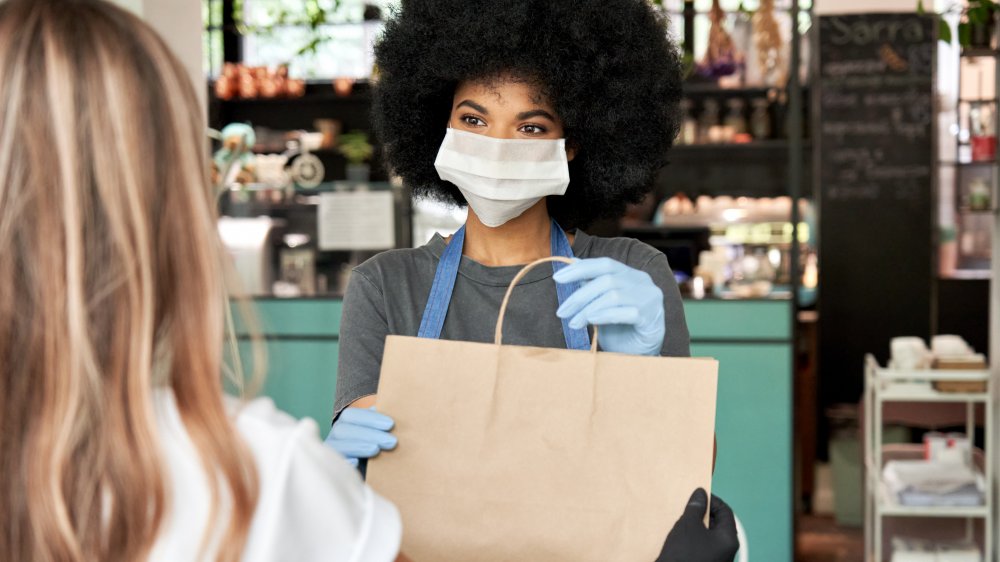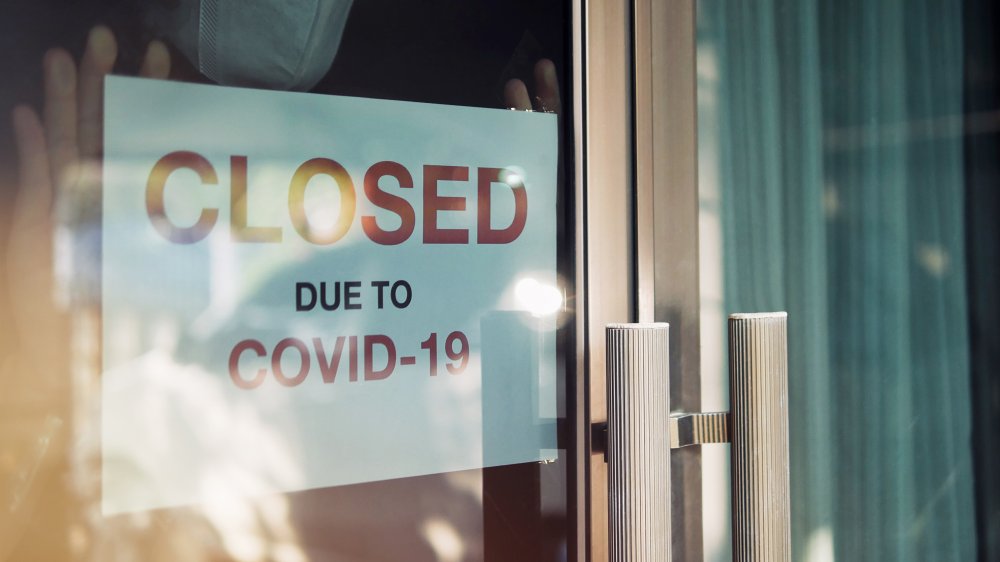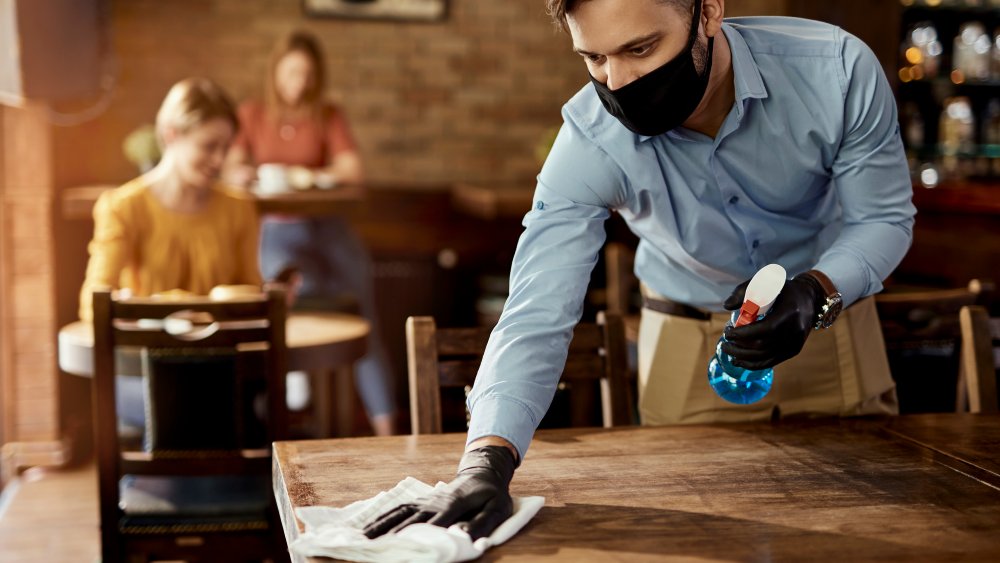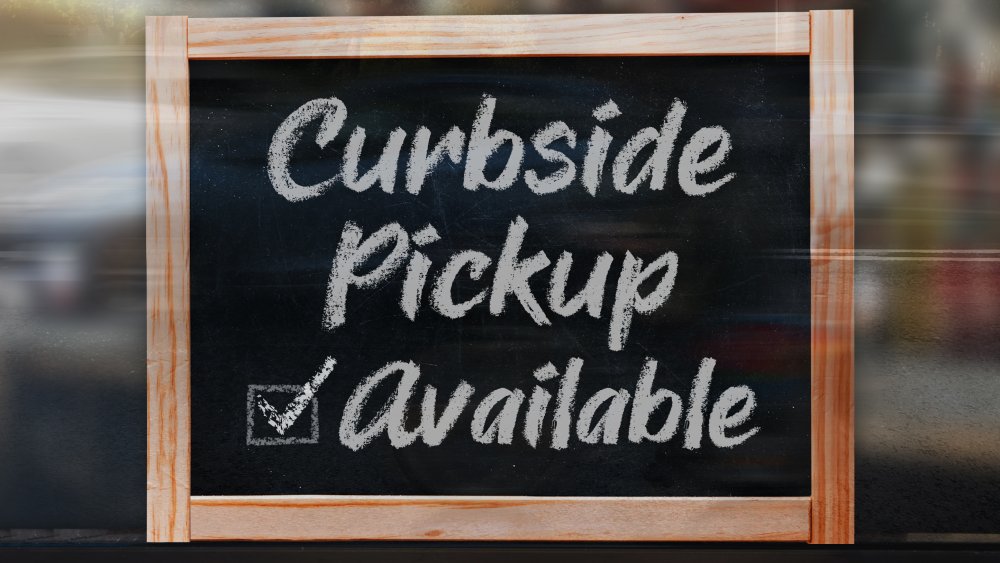Andrew Zimmern Makes Frightening Prediction About The Future Of Independent Restaurants - Exclusive
Whether you're wandering through the streets of Paris with a croissant in your hand, or discovering how a neighboring state grills its burgers a bit differently, enjoying local cuisines is one of the highlights of traveling. Of course, the coronavirus has made these discoveries a distant memory — which is why so many of us are binging Andrew Zimmern shows like crazy lately. Whether we're digging through all 22 seasons of his Travel Channel show, Bizarre Foods, or have discovered his new series, The Zimmern List, Zimmern's far-flung taste tours help make up for the fact that our own culinary adventures these days are limited to curbside takeout or a socially distant table.
But let's not take for granted those restaurants that have been feeding us through the pandemic. Because, according to Zimmern, the majority of them are facing imminent extinction. In an exclusive interview with Mashed, Zimmern explained why he's crusading on behalf of the Independent Restaurant Coalition, a lobby group that's been fighting to get support for independent restaurants in the pending coronavirus economic relief bill. "When there's a tornado or a hurricane, the first people that show up are people from restaurants — their own restaurants destroyed," Zimmern explained. "We always show up and cook food, always. And that's really all we want to do is be able to show up in our own restaurants... and spread the joy that we know takes place when someone sits down in our establishments and shares a meal with another human being."
What will happen to independent restaurants if the coronavirus relief bill isn't passed
How serious is the financial crisis that local restaurants face? Zimmern said about three quarters of all independent restaurants will have to shutter their storefronts if the $120 billion economic relief package, called the Restaurants Act, isn't signed into law. This act is part of the pending coronavirus relief bill, which is in active negotiations between Congress and President Donald Trump; Speaker of the House Nancy Pelosi has expressed concerns that this bill is far from a done deal (per CNBC).
But Zimmern said it only makes financial sense for the Restaurant Act to be passed. "It calls for $120 billion over the next 12 to 18 months, to support independent restaurants, including tax credits that allow us to bring back all of our employees. So this is very, very crucial," he explained. If it gets cut from the economic package, Zimmern warned that there will be a domino effect as the majority of restaurants will need to shutter their doors. "We will see an extinction event, and we will lose 75 percent, maybe more, of restaurants in America," Zimmern said. "That would be catastrophic to our nation's economy and to our unemployment numbers."
Why our economy will tank without independent restaurants, according to Zimmern
According Zimmern, approximately 13 million Americans work for independent restaurants, and these businesses contribute to our gross national profit and pay a tremendous portion of business taxes at the local level. "When collectively piled together, independent restaurants are anywhere from 580 to 630,000 businesses, with well over a trillion dollars in revenue, representing almost 5 percent of national GDP," he explained. "We represent right now, the largest percentage from any individual business group of unemployed Americans in the current economic downturn. At the same time, we are the cornerstone of the tourism industry, the cornerstone of neighborhood community, state and national cultural beneficiaries. We are unique employers."
Independent restaurants employ people at all walks of life, Zimmern noted. "We're the number one employer of single moms, the number one employer of returning citizens, the number one employer of first-time jobholders," he said. "Most recently, I found out, [we are] the number one employer of last-time job holders." Zimmern noted that when they lose jobs at restaurants, these employees won't be able to find similar work in other industries. "A single mom loves working three or four shifts in a restaurant, to help make ends meet, because of the flexibility in the hours. She's not going to get a job — or single dads — are not going to get a job at the plant, punching a clock 9:00 to 5:00," he said. "It doesn't make sense as a single parent."
It's time to take care of small businesses — not just big businesses
Although the Restaurant Act is part of a hot political controversy — as Congress and the president play the blame game on why they can't reach a deal on coronavirus relief legislation — Zimmern said he actually got involved in this cause months ago, in March, when he and a few dozen other restaurateurs realized how perilous things looked for their industry due to pandemic lockdowns and restrictions. "The idea was we wanted to have a group that solely focused on policy change and lawmaking on Capitol Hill, in Washington, D.C., sufficient to assist the most important group of businesses in America that is traditionally overlooked any time we have a recession or a catastrophe — natural, man-made, doesn't matter. And that's the restaurant industry," Zimmern explained. "However, historically, when you look back at the last three big economic bailouts prior to March of this year, the restaurant industry is overlooked. Much smaller, less impactful, less important business genres get relief. They're dwarfed by our size."
Zimmern believes it's unconscionable that the cruise industry has gotten bailouts in the past, while local restaurants have been neglected. "If you think about a small town in northern Minnesota, population 5,000, there might be two hardware stores. But there are many restaurants of all different types. And so, the contributions to the fabric of society, from Main Street, USA and small towns, to our fancy restaurants in big cities, is a vital, vital industry. And most importantly, because of the vast majority of employees we have, and the 5 percent of GDP that we represent, we should be given relief first, not the cruise ship industry," he said. "They've gotten the bailout every single time before us. They carry almost no employees. They pay almost no taxes. They all are offshore companies. It's horrific!"
How foodies can support local restaurants in a crisis
If you're concerned that your favorite neighborhood joint will be among the 75 percent of restaurants that go under, according to Zimmern's prediction, there are ways you can help. First of all, get political, said Zimmern. "I would encourage people to push their city and state governments to help those restaurants that cannot afford the partitions and the [personal protective equipment] for their employees in the kitchen and the air filtration systems and all that stuff that the fancier restaurants can," he said. "Hopefully, the pressure on city and state governments will go upstream, or downstream, I guess, depending on how you want to look at it, to the federal government, where we have seen a crushing absence of leadership."
Beyond that, put your money where your mouth is, and eat local, Zimmern advised. "Find the places in your neighborhood. I always believe in growing where you're planted. Find the places that you love, the places that you eat out in, the places that you have relationships with, the places that make you feel good. Frequent them," Zimmern added. And if you're anxious about eating out because of the pandemic, "everyone is doing takeout. I love contact-less pick-up for the restaurants in your neighborhood," ZImmern advised. "Show your face, tell the people who are working there you support them, wave in the window, give them a thumbs-up, do a virtual hug from outdoors."
The local restaurant workers need your business and your emotional support, Zimmern added. "I mean, those people are showing up as deemed essential, to help keep the food chain, to keep other industries alive. Food people always show up, and I think it's vitally important that we recognize them. So I would encourage people, take the dog out for a walk, go to the neighborhood restaurant, and do pick-up, whether it's snowing or raining or whatever."




